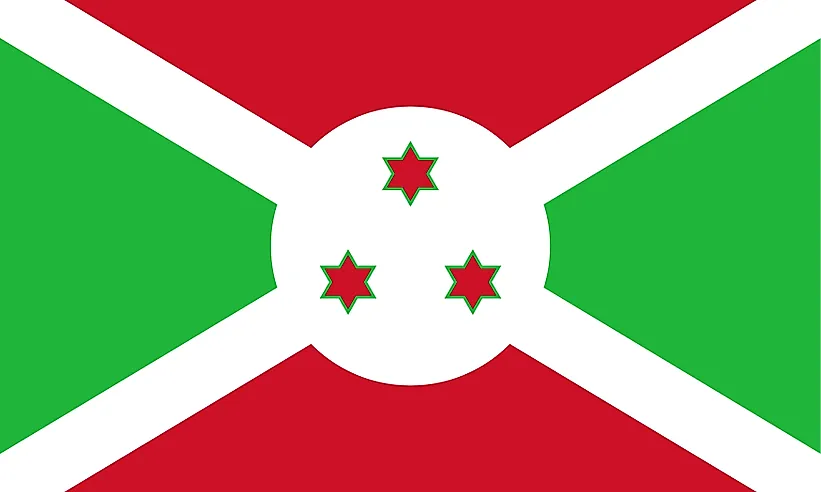
Burundi
| Continent | Africa |
| Capital | Bujumbura |
| Population | 11,099,298 |
| GDP | $7.89 Billion |
| GDP per Capita | $800 |
| Dialing Code | +257 |
| ISO Code (2-letter) | BI |
| ISO Code (3-letter) | BDI |
Burundi Landscapes






About Burundi
Welcome to Burundi, a small but culturally rich nation in the heart of East Africa. With approximately 12 million people occupying just 27,830 square kilometers, Burundi is one of Africa’s most densely populated countries. Despite its challenges, this landlocked nation offers visitors a unique blend of natural beauty, traditional culture, and warm hospitality, earning it the nickname “The Heart of Africa.”
Geographic Features and Natural Beauty
Burundi’s geography is characterized by a diverse landscape of mountains, plateaus, and lakes. The country lies along the East African Rift Valley, with elevations ranging from about 770 meters at Lake Tanganyika to 2,670 meters at Mount Heha, the country’s highest point.
Lake Tanganyika, one of Africa’s Great Lakes, forms much of Burundi’s western border and is one of the world’s deepest and longest freshwater lakes. The lake’s pristine waters host unique species of fish and provide important resources for local communities.
The country features several protected areas, including Kibira National Park, which contains some of Central Africa’s last remaining mountain forest, and Ruvubu National Park, home to diverse wildlife including hippos, crocodiles, and numerous bird species.
Cultural Heritage and Traditions
Burundian culture is deeply rooted in tradition, with drumming and dance being particularly significant cultural expressions. The famous Burundian drummers, recognized by UNESCO as Intangible Cultural Heritage, perform complex rhythms that have been passed down through generations.
Traditional crafts include basket weaving, pottery, and woodcarving, with many artisans continuing centuries-old techniques. The country’s oral traditions, including storytelling and poetry, play an important role in preserving historical knowledge and cultural values.
Burundian cuisine reflects the country’s agricultural heritage, featuring dishes based on beans, bananas, sweet potatoes, and cassava. The traditional drink, ikigaji (banana beer), remains an important part of social gatherings and ceremonies.
Historical Journey
Burundi’s history dates back to early settlements by Twa hunter-gatherers, followed by Hutu farmers and Tutsi pastoralists. The region developed into a kingdom under Tutsi rule in the 16th century, maintaining its independence until German colonization in the late 19th century.
After World War I, the territory became part of Belgian-administered Ruanda-Urundi until independence in 1962. The post-independence period has been marked by political challenges and conflicts, though recent years have seen efforts toward reconciliation and development.
Modern Economic Landscape
Today’s Burundi has an economy primarily based on agriculture, with coffee and tea being the main export crops. The majority of the population engages in subsistence farming, growing crops like bananas, beans, sweet potatoes, and cassava.
The country has been working to diversify its economy and attract investment, particularly in sectors such as mining, tourism, and infrastructure development. Recent discoveries of rare earth elements and other minerals offer potential for economic growth.
International Relations and Global Position
Burundi maintains active participation in regional organizations including the East African Community and the African Union. The country works with various international partners on development projects and has been making efforts to strengthen regional integration.
Did You Know?
• Burundi is considered one of the potential sites for the source of the Nile River?
• The country’s traditional drummers are recognized by UNESCO as a Masterpiece of the Oral and Intangible Heritage of Humanity?
• Burundi’s coffee is highly regarded in the specialty coffee market, particularly its Bourbon variety?
• The country is home to some of the world’s last remaining populations of East African chimpanzees?
Conclusion
Burundi represents a nation working to overcome challenges while preserving its rich cultural heritage and natural resources. From its drumming traditions to its coffee plantations, from its mountain forests to Lake Tanganyika’s shores, Burundi offers unique experiences and perspectives. As it continues on its path of development and reconciliation, Burundi remains committed to building a peaceful and prosperous future while maintaining its cultural identity and natural heritage.